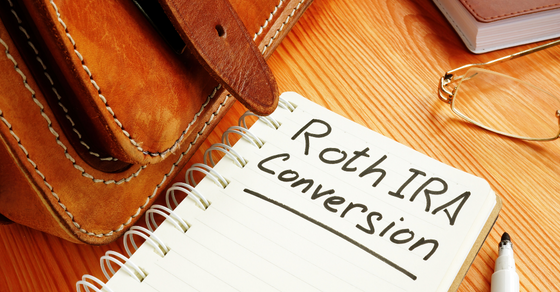
Most individuals saving for retirement outside of a defined work plan use an Individual Retirement Account, better known as an IRA. These accounts come with two vastly different types, depending on what tax benefits account holders would like to take advantage of. The first, the Traditional IRA, allows the account holder to deduct contributions made during the tax year, thus lowering their adjusted gross income (AGI). The Roth IRA, on the other hand, is funded with post-tax dollars, and money can be withdrawn after retirement age completely tax-free.
Don’t fret! If the Roth IRA sounds like a better option for you, but you have money in a Traditional IRA account, you could potentially convert it to a Roth IRA. Below, you’ll discover the basics of how to convert the account and why now might be a good time to do so.
Roth IRAs offer a way for savers to put aside money for retirement using post-tax dollars. Because of this, the contributions cannot be used as a tax deduction, and withdrawals on deposits and gains are tax-free after retirement age (59 ½). Contributions to a Roth IRA begin at $6,000 and decrease the higher your income. Once a married couple reaches $214,000 in AGI, the ability to contribute directly to a Roth IRA is eliminated.
Traditional IRA accounts can be converted to Roth IRA accounts so that the money in the account can then grow tax-free. In addition to the tax-free gains, there are several other benefits of a Roth IRA, including:
The process is typically simple.
The funds are transferred directly from a Traditional IRA to a separate ROTH IRA. Tax will be due on the amount transferred; however, growth with the market recovery will now be in your non-taxable account.
In short, converting a Traditional IRA to a Roth IRA can hold several tax and wealth management benefits for account holders. Completing the process when the stock market has dipped, and income tax rates are low can decrease the tax liability on the transferred balance, making the IRA conversion more advantageous to investors.
To discuss your specific situation and whether a Roth IRA conversion is the best move for you, reach out to our team of tax professionals today!
Please note that the information provided in this article is current as of July 2022. It is intended for general informational purposes only. It is not intended to be used for the purpose of avoiding penalties under the Internal Revenue Code. Consult with your financial advisor about your specific situation.
Receive Free financial tips & Tax Alerts!
"*" indicates required fields
If you inherit assets after a loved one passes away, they often arrive with a valuable — but frequently misunderstood — tax benefit called the step-up in basis. Below is…
Suppose you’re thinking about setting up a retirement plan for yourself and your employees. However, you’re concerned about the financial commitment and administrative burdens involved. There are a couple of…
If you’re considering making asset transfers to your grandchildren or great grandchildren, be sure your estate plan addresses the federal generation-skipping transfer (GST) tax. This tax ensures that large estates…